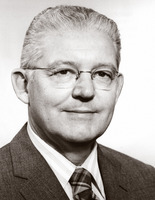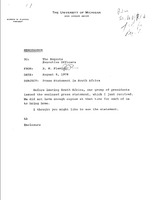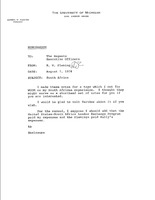Administrative Voices
As student activists became more vocal about South African apartheid throughout the 1970s, the University’s administration did not ignore the students’ concerns. Instead, University presidents, Regents, and other employees approached the issue carefully and thoughtfully. Many of the administrators spent time researching the issue and discussing it amongst themselves. Some of them engaged in dialog with the students through letters or The Michigan Daily’s editorial page. University of Michigan President Robben Fleming even travelled to South Africa to learn more about apartheid. While no one believed that apartheid was a good thing, the administration had different concerns and priorities than the students. As a result, their research and discussions often led them to different conclusions and solutions than the student activists.
From the beginning of the divestment debate, University Presidents played a key role in the discussion. They acted as intermediaries between the Regents, University employees, and students. These two letters from Robben Fleming, U of M’s president from 1968 to 1979, written in the fall of 1977, show him grappling with a rapidly shifting situation as the divestment issue emerged on campus. In his letters, Fleming acknowledges that the University should have responded more quickly to concerns about South Africa. He points out that events like Steve Biko’s murder and crackdowns by the South African government have pushed the students to call for “more severe action” like full divestiture. Meanwhile, he recognizes that the Regents are unlikely to support anything but the Sullivan Principles. Furthermore, he says even if the University adopts the Principles, he is “not sure it is going to satisfy anyone on our campus.” The letters show Fleming trying to come up with a solution to the problem that would satisfy the activists and the Regents. Through the letters, he is seen consulting other university presidents, U of M faculty, and other University employees. His letter to Brinkerhoff suggests he is brainstorming a compromise plan, perhaps partial divestment. Ultimately, Fleming’s predictions would prove correct. The Regents endorsed the Sullivan Principles in their March 16, 1978 resolution and the student activists were greatly dissatisfied. However, the passage of the resolution would not end Fleming’s investigations into the issue.
President Fleming Goes to South Africa
In the summer of 1978, President Fleming went to South Africa as part of a United States South Africa Leader Exchange Program (US-SALEP) symposium in Johannesburg. US-SALEP was officially founded in 1958 to “foster interaction, mutual respect, and an ethos of cultural diversity among the disparate and polarized groups in both the United States and South Africa”. The idea for US-SALEP was developed in May 1955 at an American Friends Service Committee meeting. The meeting included leaders from religious, philanthropic, educational, and cultural organizations who discussed the importance of two-way exchanges between the US and South Africa. The first meeting in 1958 broke South African law, which prohibited multiracial meetings, and had to take place at the airport in Johannesburg to prevent prosecution. By the time that anti-apartheid divestment movements began to occur, US-SALEP had become a source of information for university presidents around the world. The South Africa trip was especially important for President Fleming because the University’s Board of Regents had passed their first resolution on South African investments four months earlier. President Fleming was joined at the symposium by presidents from Clark College, Denison University, the University of Notre Dame, and Hampshire College.
On July 22, 1978, the five university presidents sent out a press release, stating, “We have come to this country because on our campuses, as across our land, there is great concern about South Africa”. The press release went on to point out “three troublesome dimensions of the society”, which were racial segregation, establishment of universities organized by race, and the repressive system that without due process or reason charged black citizens for crimes. While the university leaders note at the beginning that they have been treated well and had a pleasant trip, on the last “troublesome dimension” they forewarn that “this radical abridgement of justice is bound to prejudice relations between South African and American institutions”. This prejudice is expanded on by the claim that “any coherent American foreign policy must be consistent with our own values and interests as those relate to human rights and race relations”. The press release concludes with the presidents recommending the elimination of apartheid practices and educational segregation.
Upon his return, President Fleming sent out a memorandum on August 7, 1978 to the Regents and executive officers of the university with his notes on South Africa that he used for an interview with WUOM, the University of Michigan radio station. In the interview, President Fleming was quick to denounce the deplorable conditions of the apartheid system, but also offer reasons as to why UM should not divest. On divestment he said, “I have stated my views on that in the past, and I have nothing to add except to indicate that Blacks in South Africa are widely split on the issue”. Three perspectives from members of South Africa’s black population were then used of which two gave support for US companies to stay invested in order to ensure that their foreign branches lived up to the social responsibilities they claimed, and so that American corporations could monitor the conduct in their outposts. Most striking, is Fleming’s comment that “Most of the students, Black or White, may favor divestiture, but at the same time many of their spokesmen did not want severance of contacts with South African universities”. President Fleming ended his interview saying, “[The] result of above is that I believe the Regents were right in their action” to affirm the Sullivan Principles, endorse improvements in rights for employees and to ask corporations for regular reports.
Fleming’s experiences in South Africa allowed the Administration to better justify UM’s policies on investment in South Africa. Additionally, it showcased how the battle against apartheid was focused on corporations. Students in the anti-apartheid movement at Michigan were actively and aggressively protesting Michigan’s investment in corporations, but were using the connections the university had with South African institutions to draw support for their cause. Instead of criticizing the racial segregation of education, the movement focused on the divestment of apartheid supporting companies to bring about a change in social and educational aspects of life in South Africa.
Administrative Perceptions and Reactions
If adopted by University leadership, divestment would ultimately be accomplished by University financial officers. Alice Preketes, a U of M alumni and employee in the Donor Relations Office during the anti-apartheid movement, recalled, in a 2015 interview, a "polite," but "frustrated" student movement on campus. According to Preketes, many officials recognized the need to do something about apartheid, but approached the issue with certain other priorities in mind:
It was pretty obvious to most people that [apartheid] wasn't right and something needed to change and so it was good that the students kept it in front of the regents... You realize that a change like that is extensive and you don't just change it without making sure that you have a structure in place to make the change successful. So what I remember about it is that there was a lot of activity going on and the students were very impatient about it taking place because students are impatient, and behind the scenes, a lot of people were trying to figure out how they could do this and foster the change that everybody knew had to happen.
Prominent factors in this decision were the financial health of the University, relationships with donors, and alumni working in the affected corporations, as well as making sure that the proposed actions did not hurt black South Africans. As Preketes explains, University donors were committed to the financial security of the University as the debate unfolded:
[Donors'] first concerns were that the University be adequately funded if they made the divestiture, and these donors would be the ones that gave the money or the stocks in the first place. It just takes a lot of money to run an organization like the University of Michigan, so you have to think clearly. It's not that anyone was in favor of apartheid; it's just that people wanted it to be addressed in a logical and prudent manner.
Regents' Positions
As the group responsible for directing university policy, the Michigan Regents had much to say about divestment. Thomas Roach, a Detroit lawyer and Democratic U of M Regent from 1975 to 1990, was one of the people most staunchly opposed to divestment. While he remained against divesting for many years, it was not blind opposition. He continued to research the issue. Roach read articles and reports, engaged in correspondence with student activists and South African government officials, and attended panels and debates. In this September 1979 letter to the other Regents, Roach discusses his thoughts on some issues regarding South African investments that would be brought up in their upcoming meeting. The letter shows him to be firmly on the opposite side of the issue from the student activists. He reasons that “if corporate presence is helpful, corporate expansion is helpful” and that bank loans can “benefit the total population, including the victims of apartheid.” However, the letter shows that he is researching the issue in several different sources. He not only references University documents like the report of the Senate Advisory Committee on Financial Affairs (SACFA) but also revisions to that report suggested by members of the WCCAA. Additionally, he includes a New Republic article and refers to studies by the Rockefeller Foundation and the South African government’s Wiehahn Commission. Furthermore, his views were not completely static. In response to question three, he reveals that some of his views have changed since the last time the Regents considered these issues. Although his views on specific details may have shifted slightly, Roach was still firmly opposed to divestment. This stiff opposition by Roach and other Regents, like Republican Deane Baker, not only led them into conflict with the student activists, but also would soon cause a legal showdown with the state of Michigan.
Sources for this page:
The United States South Africa Leadership Development Programme, "What Is USSALEP?," http://home.intekom.com/bbn/bbn/ussalep/what.html.
Interview of Alice Preketes by Mario Goetz April 6, 2015, Ann Arbor, MI.





